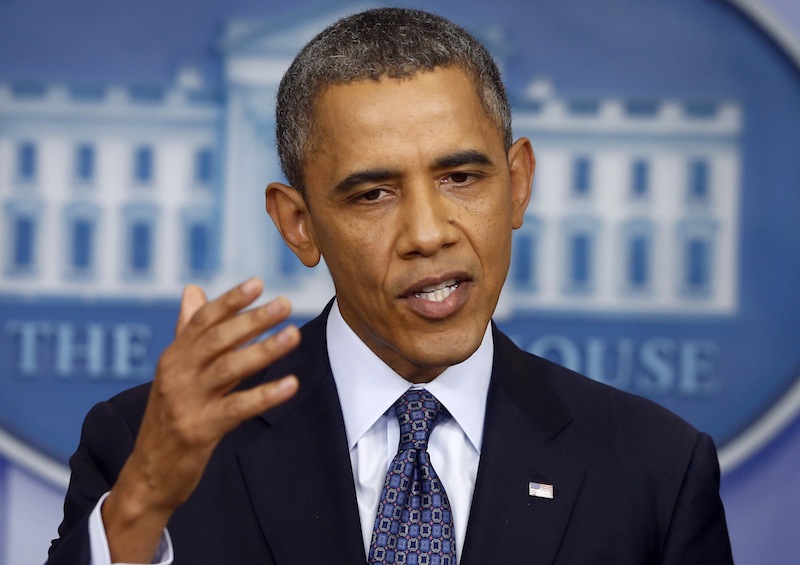The morning after Congress acted to re-open the government and avert debt default, President Barack Obama sought to resuscitate his stalled second-term by laying out his top three priorities: a budget agreement, immigration reform and a farm bill.
“Those are three specific things that would make a huge difference in our economy right now,” he said in a televised speech. “And we could get them done by the end of the year if our focus is on what’s good for the American people.”
Here is the prognosis for each of the three.
#1: Budget Deal. Prognosis: GLOOMY
“The key now is a budget that cuts out the things that we don’t need, closes corporate tax loopholes that don’t help create jobs, and frees up resources for the things that do help us grow — like education and infrastructure and research. So that’s number one.”
The government funding law sets up a House-Senate budget conference tasked with a Dec. 13 deadline to reach a deal or go bust. But despite the grueling shutdown fight, the dynamics that have prevented a budget deal since 2011 — and spurred an era of crisis governance — haven’t changed at all. And that’s why members of Congress aren’t optimistic.
Republicans won’t accept any new tax revenues and will cling to every last dollar of spending cuts they’ve extracted from Obama, especially now that it’s clear their hostage-taking efforts are doomed to fail in the future. And Democrats won’t cop to tax reform, entitlement reform or further spending cuts unless Republicans agree to close tax loopholes on high-earning individuals or corporations.
The one sign of hope for a deal is that both sides dislike the way the sequester cuts are apportioned. Republicans want to replace the across-the-board cuts to the military (another $20 billion of which will take effect on Jan. 15); Democrats want to replace the across-the-board cuts to domestic programs like Head Start and cancer research. But the sequester has gone into effect and that hasn’t proven enough to force either side to back off their stance and pave the way for a deal.
#2: Immigration Reform. Prognosis: VERY GRIM
“Number two, we should finish the job of fixing our broken immigration system. There’s already a broad coalition across America that’s behind this effort of comprehensive immigration reform — from business leaders to faith leaders to law enforcement. In fact, the Senate has already passed a bill with strong bipartisan support.”
In June, the Senate passed a sweeping immigration overhaul by a 68-32 margin, which is projected to cut the deficit by $200 billion and help the economy. But the House Republican majority hates that bill and has refused to allow a vote on it. GOP lawmakers are even more determined to hand Obama a loss on immigration after he trounced them in the government shutdown fight. Rep. Raul Labrador (R-ID) warned that Obama wants to enact reform in order to “destroy” the GOP. The fact that Republican incumbents are fending off conservative primary challengers in a few months makes them less likely to green-light any form of “amnesty.”
Speaker John Boehner (R-OH) has vowed that any immigration bills would go through the regular process. He is deferring to House Judiciary Chairman Bob Goodlatte (R-VA), who has ruled out a pathway to citizenship. Conservatives reject the idea that Congress should grant permanent residency to anyone living in the country illegally. Without that component, support for reform falls apart.
Success depends on one of three outcomes — all unlikely: conservatives back down, Boehner shuns the will of his members or Democrats win control of the House in 2014.
#3: Farm Bill. Prognosis: MEDIUM
“Number three, we should pass a farm bill, one that American farmers and ranchers can depend on; one that protects vulnerable children and adults in times of need; one that gives rural communities opportunities to grow and the long-term certainty that they deserve.”
The two chambers have appointed conferees and initiated staff-level discussions to reconcile their very different farm bills, the vehicle for reauthorizing spending on food stamps — a very effective economic stimulator in bad times — and agriculture subsidies. The bipartisan Senate version cuts food stamps by $4 billion. The partisan House GOP version cuts it by a whopping $40 billion, at the behest of conservative advocacy groups.
Reconciling the two won’t be easy, but there’s a will on both sides and influential constituencies pushing for a new farm bill. The big question, as is often the case in this Congress, is how to placate the staunch conservatives who call the shots in the House to accept a spending level on food stamps that is acceptable to Democrats and moderates.
If Congress fails to enact a new farm bill, or reauthorize the existing one, the law would revert to the Truman-era farm bill of 1949, which would keep the food stamp program intact but could lead to significant disruptions, like skyrocketing milk prices.






